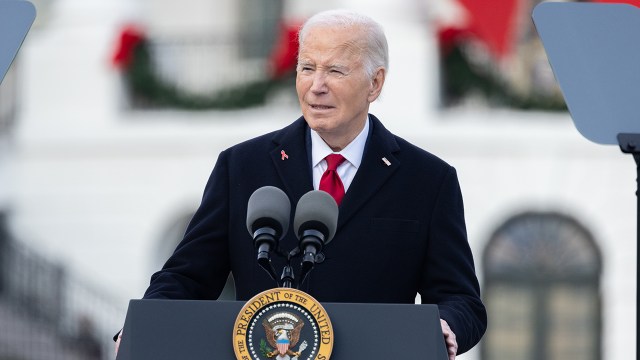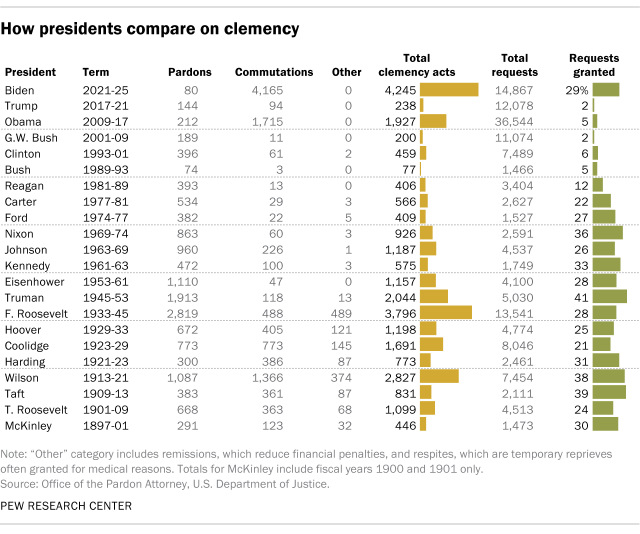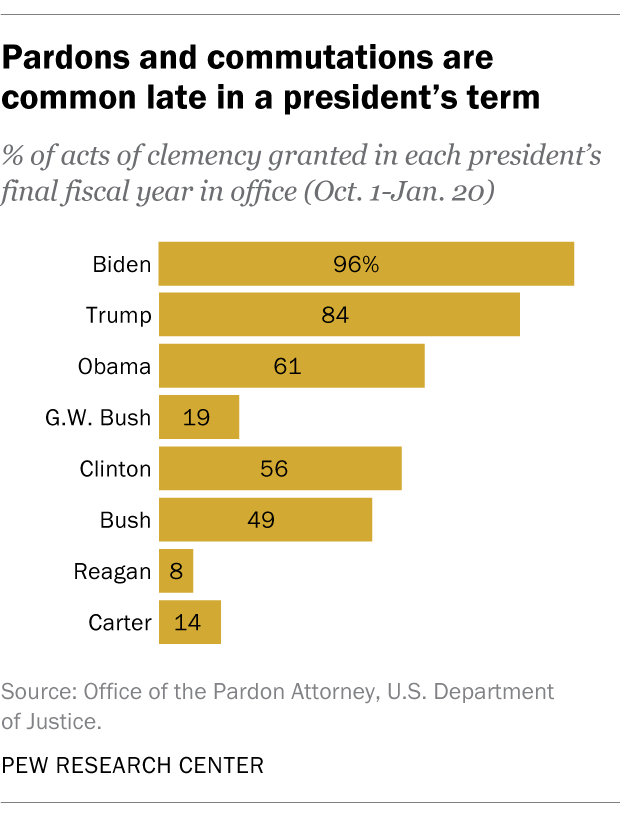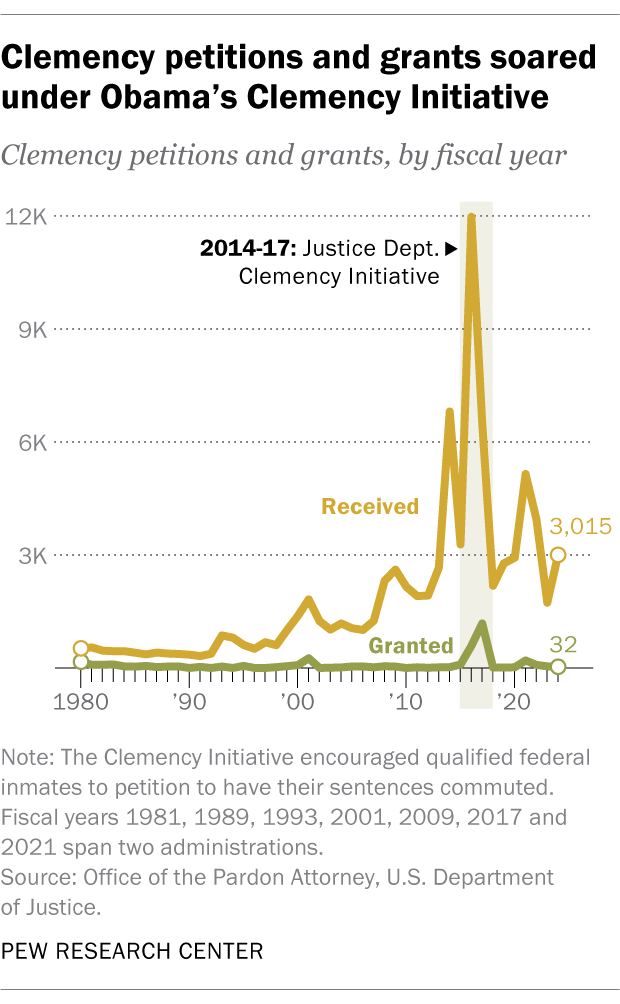
Former President Joe Biden granted more acts of clemency than any previous chief executive on record, according to a Pew Research Center analysis of statistics from the U.S. Department of Justice.
Overall, Biden granted 4,245 acts of clemency during his four-year tenure in the White House. That far exceeds the total of any other president since the beginning of the 20th century, including Franklin D. Roosevelt, who granted 3,796 such acts during his 12 years in office. It is also far ahead of the current total of President Donald Trump.

Looking at the Justice Department data another way, Biden granted 29% of the clemency requests he received. That was the highest percentage of any president since Richard Nixon, who granted 36% of the petitions he received. (Biden, however, received far more requests than Nixon – 14,867 versus 2,591.)
The clemency power is enshrined in the U.S. Constitution and can refer to multiple forms of presidential mercy:
- Pardons forgive past crimes and restore civil rights.
- Commutations completely or partially reduce sentences for people in prison or on community supervision.
- Remissions reduce financial penalties associated with convictions.
- Respites are temporary reprieves usually granted to inmates for medical reasons.
The Justice Department’s statistics do not count clemency granted to entire classes of people by proclamation, such as the actions taken by Presidents Jimmy Carter and Gerald Ford to forgive thousands of Vietnam War-era draft dodgers. Biden granted clemency this way, too: In October 2022 and December 2023, he granted pardons by proclamation to people convicted of certain federal marijuana offenses. And in June 2024, he issued a proclamation granting pardons to former military service members convicted of violating a since-repealed ban on consensual gay sex.
A closer look at Biden’s pardons and commutations
Over four years, Biden issued 80 pardons and 4,165 commutations for a total of 4,245 acts of clemency.
The number of pardons Biden issued is the second lowest on record; only George H.W. Bush granted fewer (74). But the nature of some of Biden’s pardons is historically unique. Biden issued “preemptive pardons” to several prominent people who had not been convicted of, charged with or even investigated for any crimes. They include Dr. Anthony Fauci, the longtime director of the National Institute of Allergy and Infectious Diseases; retired Gen. Mark Milley, the former chairman of the Joint Chiefs of Staff; several members of his own family; and members and staff of the U.S. House committee that investigated the Jan. 6, 2021, riot at the U.S. Capitol, as well as police officers who testified before the panel. Biden said he issued the pardons preemptively to protect recipients against potential future prosecutions by the Trump administration.
Related: How Americans view Biden’s pardons related to Jan. 6
Unlike his relatively infrequent use of pardons, Biden stands out for the sheer number of commutations he granted. His total was more than double the number granted by the next-closest president, Barack Obama, who issued 1,715 during his eight years in office.
Biden’s many commutations included a near-total emptying of the federal government’s death row. On Dec. 23, 2024, he commuted the sentences of 37 of 40 federal death row inmates to life imprisonment without the possibility of parole. The three death row inmates whose sentences Biden did not commute were convicted in cases involving terrorism or mass murder.

Biden also saved nearly all of his clemency acts until the final weeks of his presidency. While every president since Ford has issued pardons or commutations in his last days in office, Biden granted 96% of his acts of clemency in his final fiscal year – the period between Oct. 1, 2024, and his departure from the White House on Jan. 20. On Jan. 17 alone, he granted 2,490 commutations, more in a single day than any prior chief executive had granted over their entire presidency.
Biden’s expansive use of clemency contrasts with recent trends
Before Biden, presidents had generally become less forgiving over time, at least when looking at the share of clemency requests they granted. Every president from William McKinley to Carter granted at least 20% of the requests they received. But that percentage fell to 12% for Ronald Reagan and to single digits for every subsequent president – until Biden.

Obama’s clemency record tells a mixed story. In absolute numbers, Obama granted more acts of clemency than most recent presidents (1,927). But that still worked out to just 5% of all the clemency requests he received – among the lowest percentages of any president.
Obama’s low percentage was largely due to the fact that his administration encouraged federal prisoners to apply for leniency under a program known as the Clemency Initiative. The program, which launched in April 2014 and ended when Obama left office in 2017, established specific criteria that the administration would prioritize in clemency decisions. Overall, Obama received more than 36,000 clemency petitions during his time in office, by far the most of any president.
Acts of clemency have often been controversial
Several aspects of Biden’s clemency record – including his use of preemptive pardons and the pardons he issued to members of his own family – have drawn backlash. But Biden is far from the only president to spark controversy over his use of the clemency power.
In January, only hours after taking office for his second term, Trump issued a proclamation pardoning nearly all of the people who were convicted for their role in the Jan. 6, 2021, riot at the Capitol. He also commuted the sentences of several others who had been serving long prison terms for their part in the riot.
Related: How Americans view Trump’s pardons related to Jan. 6
In his first term, Trump drew criticism for granting clemency to many people who had a “personal or political connection to the president,” and he often circumvented the formal process for considering clemency requests, according to analyses by the Lawfare blog. (Biden also circumvented this process at times, including when he pardoned his son Hunter.)
Obama’s frequent use of commutations, particularly for prisoners convicted of drug-related crimes, prompted objections from Republicans at the time. Critics said it infringed on the “lawmaking authority” of the legislative branch.
Bill Clinton drew bipartisan condemnation for pardoning a fugitive commodities trader, Marc Rich, on his last day in office in 2001. And Clinton, like Biden, also pardoned a family member. On the same day he pardoned Rich, he pardoned his half-brother Roger Clinton, who had been convicted of selling cocaine.
Perhaps the most famous act of clemency in U.S. history was a preemptive pardon for a former president himself. On Sept. 8, 1974, in the wake of the Watergate scandal, Ford pardoned Nixon for any federal crimes he “committed or may have committed,” even though Nixon hadn’t been charged with a crime at the time.
Note: This is an update of an analysis originally published on Dec. 9, 2016.
